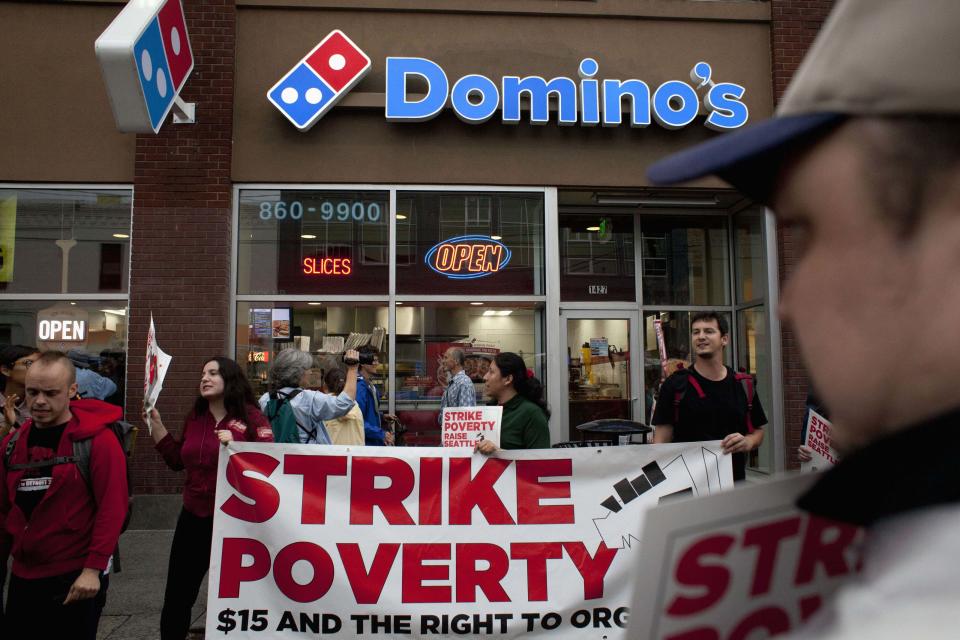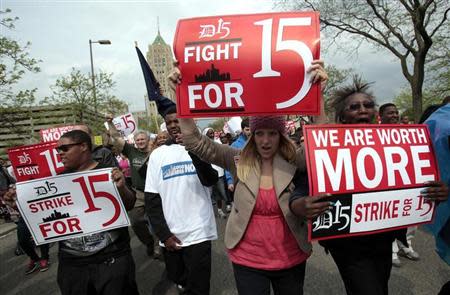Ontario urged to raise minimum wage above poverty line
The debate over Ontario’s minimum wage is heating up as a government appointed panel gets closer to recommending how future increases should be set.
A new report from the Canadian Centre for Policy Alternatives (CCPA) argues the current rate of $10.25 per hour, which has been in place since 2010, is dragging more people in poverty and preventing, not enabling, economic growth.
The CCPA challenges the argument that paying minimum-wage workers would be a job killer by adding more costs to already burdened businesses across the province.
Instead, it says a higher rate – which it recommends as $14.50 an hour by 2016 - would benefit companies through increased employee retention. A higher rate will also boost employees' purchasing power, which is good for the overall economy, the report says.
Ontario’s current minimum wage is below the poverty line for full-time workers and short of living-wage calculations across the province that range from $18.69 in Halton to $14.95 in Hamilton, the report states.
“There are many principled reasons to raise the minimum wage,” the report says. “One is to reduce the number of working poor in Ontario. A second is to reduce the burden that Ontario’s increasingly low-paying and precarious labour market is having on middle- and low-income people alike.”
Ontario’s minimum wage accounts for just 42 per cent of the province’s industrial wage of $24.22 an hour, according to the CCPA.
“On this measure, Ontario minimum wage workers track lower than every other province in Canada except Saskatchewan and Alberta,” the report says.
It recommends Ontario benchmark the minimum wage to 60 per cent of the average Ontario industrial wage – which would be $14.50 an hour, through steady increments over the next couple of years.
It believes that change would help lift more people out of poverty and provide a better balance between what employers and workers need.
Ontario’s minimum wage is the same as in B.C. and just slightly below the $10.30 rate in Nova Scotia, $10.45 in Manitoba, $10.54 in Yukon and $11 in Nunavut. Alberta has the lowest minimum wage at $9.75, followed by $10 in Saskatchewan, New Brunswick, PEI, Newfoundland and the Northwest Territories. Quebec’s rate is $10.15.
The CCPA report comes as the Ontario government appointed minimum-wage advisory panel wrapped up consultations across the province earlier this month. The six-member panel, which includes people from the business community, labour and a youth representative, is expected to give advice this winter on how the province should determine minimum wage changes in the future.
For the CCPA, it's the latest call to increase minimum wage rates across Canada. Earlier this year, it argued B.C.’s ad hoc minimum wage policy is out of step with other provinces because it’s not based on economic and social factors such as the consumer-price index and average weekly wages. Ontario, British Columbia and the Northwest Territories are the only Canadian provinces without a formal mechanism for setting or moving the minimum wage rate.
The CCPA has also applauded U.S. president Barrack Obama’s suggestion earlier this year to increase the minimum wage in America to $9 from $7.25 today. Obama also recently said he supported a Democrat's proposal to increase the rate to $10.10 per hour and tie it to the level of inflation.
A number of big-name U.S. companies have come under fire recently for how little they pay employees. Wal-Mart, the world's largest retailer, was criticized after it was discovered that a store in Ohio was holding a food drive for its own employees, while McDonald's was reportedly advising its workers to apply for food stamps as a way to help make ends meet.

 Yahoo Finance
Yahoo Finance 



